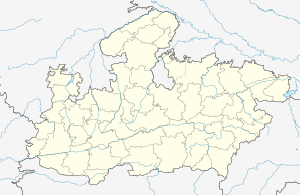Junapani (census code 482243)
Junapani is a village in the Bhopal district of Madhya Pradesh, India. It is located in the Berasia tehsil.[1] It is located near Ganga Pipaliya and Maholi.
Junapani | |
|---|---|
village | |
 Junapani  Junapani | |
| Coordinates: 23.517561°N 77.299693°E | |
| Country | India |
| State | Madhya Pradesh |
| District | Bhopal |
| Tehsil | Berasia |
| Population (2011) | |
| • Total | 1,297 |
| Time zone | UTC+5:30 (IST) |
| ISO 3166 code | MP-IN |
| 2011 census code | 482243 |
Demographics
According to the 2011 census of India, Junapani has 237 households. The effective literacy rate (i.e. the literacy rate of population excluding children aged 6 and below) is 63.26%.[2]
| Total | Male | Female | |
|---|---|---|---|
| Population | 1297 | 687 | 610 |
| Children aged below 6 years | 211 | 118 | 93 |
| Scheduled caste | 440 | 236 | 204 |
| Scheduled tribe | 0 | 0 | 0 |
| Literates | 687 | 407 | 280 |
| Workers (all) | 613 | 331 | 282 |
| Main workers (total) | 336 | 294 | 42 |
| Main workers: Cultivators | 204 | 173 | 31 |
| Main workers: Agricultural labourers | 130 | 119 | 11 |
| Main workers: Household industry workers | 0 | 0 | 0 |
| Main workers: Other | 2 | 2 | 0 |
| Marginal workers (total) | 277 | 37 | 240 |
| Marginal workers: Cultivators | 2 | 1 | 1 |
| Marginal workers: Agricultural labourers | 273 | 34 | 239 |
| Marginal workers: Household industry workers | 0 | 0 | 0 |
| Marginal workers: Others | 2 | 2 | 0 |
| Non-workers | 684 | 356 | 328 |
gollark: They can eventually if worms are really cheap and shown to be healthy.
gollark: Oh, you will.
gollark: https://tenor.com/view/coronal-mass-ejection-nasa-gif-3361280
gollark: It's false color, bee.
gollark: yes it is.
References
- Lok Seva Kendra, Berasia
- "District Census Handbook - Bhopal" (PDF). 2011 Census of India. Directorate of Census Operations, Madhya Pradesh. Retrieved 20 July 2015.
This article is issued from Wikipedia. The text is licensed under Creative Commons - Attribution - Sharealike. Additional terms may apply for the media files.